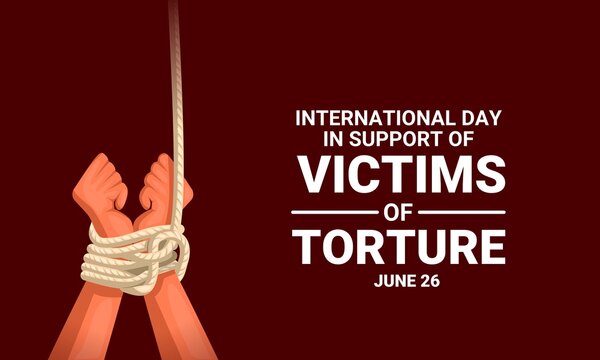In Recognition of International Day in Support of Victims of Torture Human Rights & Democracy Media Center “SHAMS” Condemns The Ongoing Torture of the Palestinian Prisoners by the Occupation State- Israel
by Omar Rahhal | Jun 26, 2022 | engNews

Human
Rights & Democracy Media Center “SHAMS”
condemns strongly the ongoing
practicing of torture committed by Israel “The Occupying Power) against the
Palestinian Prisoners in the Israeli prisons and Interrogation Centers. Although
torture. Israel is going on in torturing the Palestinian prisoners though
torture is prohibited by the international law and not allowed under any
circumstances not even the case of war and emergency. Banning torture is one of
the principles of the international customary law that is applicable to all
states including those that did not accede to any of the international
Conventions and Treaties against torture, which ban torturing any person
regardless of any circumstances. Although Israel (the occupying power) acceded
to The Convention against Torture and Other
Cruel, Inhuman or Degrading Treatment or Punishment, yet, it is still
going on in practicing the hardest forms crimes of torture and cruel inhuman
degrading crimes against the Palestinian prisoners. Palestinian prisoners,
especially kids, in the Israeli prisons are detained in hard inhuman
circumstances where the Israeli forces commit several inhuman degrading
practices against them in order to oppress and humiliate them.
“SHAMS” Center condemns the decision issued
by the Israeli Supreme Court in the year 1999 that left the door open to commit
the various forms of torture and cruel treatment against Palestinian prisoners
in case that is a “necessity” based on the estimation of the Israeli military
forces and detectives. The Israeli prisons’ authority and the detectives, including
the Shin Bet detectives, utilized the given ruling in the worst form where
cruel physical treatment is applied against any Palestinian being investigated,
for security accusation, under the claim of “risky case”. As the case is
considered necessary defense, then any investigator who tortures Palestinian
prisoners is granted impunity under the claim tat applying cruel physical
treatment is a necessity due to the risky accusation. In general, torturing
Palestinian prisoners, during investigation, is always kept secret and no
allowed for checking by an external authority.
“SHAMS” Center call upon the Palestinian
National Authority to localize the international conventions and treaties to
which State of Palestine acceded, within the local legal set. Localizing the
international conventions and treaties is essential once taking into
consideration that the State of Palestine declares itself as state that
believes in the principles of democracy and human rights as well as being
committed to the United Nations Charter and the International human Rights Law
instruments to which it acceded. On the way of embodying the principles of
human rights and democracy, then The Convention
against Torture and Other Cruel, Inhuman or Degrading Treatment or Punishment,
was one of the first conventions and treaties to which PNA acceded in the year
2014.
In addition to that the State of Palestine acceded to: the International Covenant on Civil and Political Rights, the International Covenant on Economic, Social and Cultural Rights, Convention of the Child Rights, Convention on the Elimination of All Forms of Discrimination Against Women, the International Convention on the Elimination of All Forms of Racial Discrimination, and the Convention on the Rights of Persons with Disabilities. On a related level, the State of Palestine joined, on 28/12/2017, The Optional Protocol to the Convention against Torture and other Cruel, Inhuman or Degrading Treatment or Punishment. The various human rights and conventions to which the Palestinian Authority acceded, were endorsed within the national policies agenda (2017- 2022), which reflects the willingness of the State of Palestine to fulfill its commitments towards the citizens and respect their fundamental rights as well as protecting human rights, justice, and equality for all citizens.
“SHAMS” Center emphasizes that the International Community prohibited torture through the UN General Assembly Resolution 149/ 52 released on December 12, 1997. The given resolution was designed to eliminate all forms of torture and realize effective implementation of The Convention against Torture and other Cruel, Inhuman or Degrading Treatment or Punishment that was adopted by the UN General Assembly on 10/12/1984. The Convention defined torture as a crime according to the International Law and stated that prohibiting torture is a compulsory rule. Prohibiting torture is in accordance with the international rules and principles that considers war crimes and crimes against human beings are no statute of limitations. In this regard, all the international rules or customary rules that contradict with the principle of no statute limitations become void. This principle stands as another significant factor to end the impunity of those who commit gross human rights violations. Additionally, prohibiting torture as a compulsory rule, stands as a support of another procedural rule, which is the rule of international specialization. The international specialization rule represents the integrity between the national judiciary and the international judiciary. On a related level, the given principle restricts the mobility of perpetrators of torture and states clearly that torture is a crime that is not statute of limitations, which in turn, accords with article 32 of the Amended Palestinian Basic Law.
Human Rights & Democracy Media Center “SHAMS”, calls upon the necessity to launch dialogue between the government and the Civil Society Organizations and the Independent Commission of Citizen Rights regarding the establishing the National Mechanism to Combat Torture. However, issuing the presidential decree- law (25/ 2022) regarding the given mechanism without taking into consideration the feedback and comments of the CSOs, generated from the consultations that took place through over the previous years, reflects clearly the position of the official Palestinian Institutions that are not willing to cooperate with the CSOs in this regard.
END
